 W
WAlexander Joseph, known as Alexander of Battenberg, was the first prince (knyaz) of the Principality of Bulgaria from 1879 until his abdication in 1886. He was elected Prince of autonomous Bulgaria, which officially remained within the Ottoman Empire, by the national assembly in 1879. He dissolved the assembly in 1880 and suspended the Constitution in 1881, considering it too liberal. He restored the Constitution in 1883, leading to open conflict with Russia that made him popular in Bulgaria. Unification with Eastern Rumelia was achieved and recognised by the powers in 1885. He was ousted in a coup by pro-Russian Bulgarian Army officers who forced him to abdicate in September 1886. He later became a general in the Austrian army.
 W
WAndranik Ozanian, commonly known as Andranik, 1866 is also engraved on his grave in the Père Lachaise Cemetery. Some sources also erroneously indicate 1928 as his date of death, perhaps because Andranik's body was moved to France and reburied there in 1928.</ref> was an Armenian military commander and statesman, the best known fedayi and a key figure of the Armenian national liberation movement. From the late 19th century to the early 20th century, he was one of the main Armenian leaders of military efforts for the independence of Armenia.
 W
WErich Bärenfänger was a German general during World War II. He was a recipient of the Knight's Cross of the Iron Cross with Oak Leaves and Swords of Nazi Germany. In the final days of the war, Bärenfänger was commander of several defense sectors during the Battle of Berlin; he committed suicide on 2 May 1945.
 W
WGeorg Otto Hermann Balck was a highly decorated officer of the German Army who served in both World War I and World War II, rising to the rank of General der Panzertruppe.
 W
WKliment Boyadzhiev was a Bulgarian general during the Balkan Wars and First World War.
 W
WHristo Chernopeev was a Bulgarian Army officer and member of the revolutionary movement in Macedonia. He was among the leaders of the Bulgarian Macedonian-Adrianople Revolutionary Committees.
 W
WRadko Dimitriev was a Bulgarian general, Head of the General Staff of the Bulgarian Army from 1 January 1904 to 28 March 1907, as well as a general in the Russian Army during the First World War.
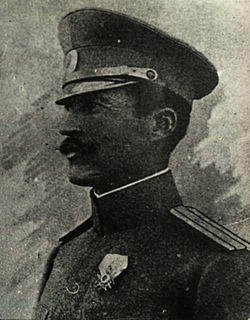 W
WBoris Stoyanov Drangov was a Bulgarian colonel and warfare pedagogue.
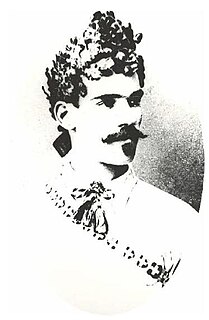 W
WLouis-Emil Eyer was a Swiss-Bulgarian sports pedagogue and public figure regarded as the founder of the sports movement in Bulgaria.
 W
WFerdinand , born Ferdinand Maximilian Karl Leopold Maria of Saxe-Coburg and Gotha, was the second monarch of the Third Bulgarian State, firstly as ruling prince (knyaz) from 1887 to 1908, and later as king (tsar) from 1908 until his abdication in 1918. Under his rule Bulgaria entered the First World War on the side of the Central Powers in 1915.
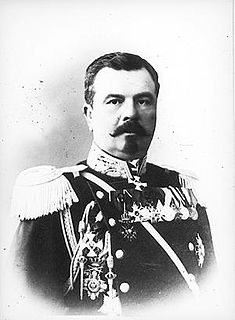 W
WIvan Fichev was a Bulgarian general, Minister of Defense, military historian and academician.
 W
WStamen Grigorov was a prominent Bulgarian physician and microbiologist. He discovered the Lactobacillus bulgaricus bacillus, which is the true cause for the existence of natural yogurt.
 W
WIvan Valkov was a Bulgarian General of Infantry who fought in World War I and later held the post of Minister of War (1923—1929).
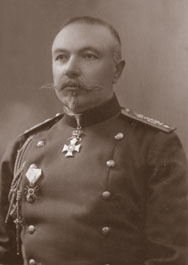 W
WNikola Ivanov was a Bulgarian general, Chief of the Headquarters of the Bulgarian Army between 10 May 1894 and 29 November 1896, Minister of war between 29 November 1896 - 30 January 1899. He is prominent for capturing Adrianople in the First Balkan War and the surrounding of the Greeks army in the Battle of Kresna Gorge which brought the end of the disastrous Second Balkan War.
 W
WAssen "Jerry" Jordanoff born Asen Hristov Yordanov, September 2, 1896, Sofia, Bulgaria – d. October 19, 1967, White Plains, New York) was a Bulgarian inventor, engineer, and aviator. Jordanoff is considered to be the founder of aeronautical engineering in Bulgaria, as well as a contributor to the development of aviation in the United States.
 W
WPanteley Kiselov was a Bulgarian soldier and general who fought in the Serbo-Bulgarian War of 1885, the Balkan Wars of 1912–1913 and World War I. He is best known as commander of the Fourth Preslav Infantry Division during the Romanian Campaign of 1916 and victor of the Battle of Tutrakan.
 W
WIvan Kolev Stoyanov was a Bulgarian lieutenant general and distinguished cavalry commander during World War I.
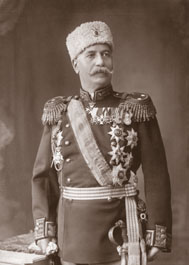 W
WVasil Ivanov Kutinchev was a Bulgarian officer. He began his military career in 1879 after graduating from the Military School in Sofia. On 13 September 1885 he was made commander of the 1st battalion of the 5th "Dunav" infantry regiment.
 W
WSava Atanasov Mutkurov was a Bulgarian officer and politician. One of only three recipients of the Order of Bravery 1st grade, he was among the chief architects of the Bulgarian unification (1885) and, as an officer in the young Bulgarian Army, one of its defendants in the Serbo–Bulgarian War (1885). He also served as one of the regents of the Principality of Bulgaria after Prince Alexander of Battenberg's abdication (1886–1887) and was Minister of War in Stefan Stambolov's government (1887–1891).
 W
WStefan Mikhailov Nerezov was a Bulgarian General and Chief of the Bulgarian Army Staff.
 W
WDanail Tsonev Nikolaev was a Bulgarian officer and Minister of War on the eve of the Balkan wars. He was the first person to attain the highest rank in the Bulgarian military, General of the infantry. He was also known as "the patriarch of the Bulgarian military".
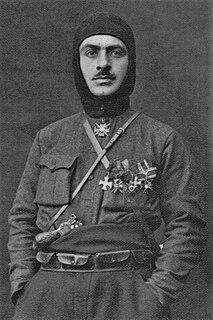 W
WGaregin Ter-Harutyunyan better known by his nom de guerre Garegin Nzhdeh, was an Armenian statesman and military strategist. As a member of the Armenian Revolutionary Federation, he was involved in national liberation struggle and revolutionary activities during the First Balkan War and World War I. Garegin Nzhdeh was one of the key political and military leaders of the First Republic of Armenia (1918–1921), and is widely admired as a charismatic national hero by Armenians.
 W
WTodor Nikolov Panitsa was a Bulgarian revolutionary figure, active in the region of Macedonia. He was one of the leaders of the left wing of the Internal Macedonian Revolutionary Organization.
 W
WRacho Petrov Stoyanov was a leading Bulgarian general and politician.
 W
WAntoni Piotrowski was a Polish Romanticist and realist painter who worked as war correspondent and illustrator for various Western European weeklies and periodicals in late-19th century during the Liberation of Bulgaria.
 W
WDimitar Popgeorgiev Berovski was a Bulgarian revolutionary from Macedonia.
 W
WAlexandar Protogerov was a Bulgarian general, politician and revolutionary, as well as a member of the revolutionary movement in Macedonia, Thrace and Pomoravlje. Protogerov was a Bulgarian Freemason and holded a leading position in the lodge where he was a member.
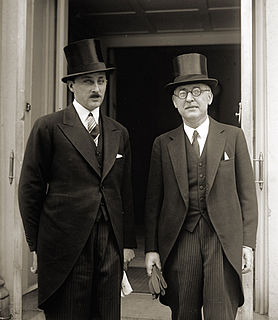 W
WSimeon Traychev Radev was a Bulgarian writer, journalist, diplomat and historian, most famous for his three-volume book The Builders of Modern Bulgaria.
 W
WHelmuth Raithel was a German officer who held the rank of SS-Standartenführer (colonel) in the Waffen-SS during World War II. While still at school, Raithel was swept up in the excitement of the Munich Beer Hall Putsch of 9 November 1923 led by Adolf Hitler, and was subsequently awarded the coveted Blood Order, even though he was not a member of the Nazi Party. He joined the Reichswehr in 1926. After World War II broke out he fought in the invasion of Greece in summer 1941, then against the Soviet Red Army in northern Finland before transferring to the Waffen-SS in 1943.
 W
WThe Samara flag is one of the most important military symbols of the Bulgarian Army. Sewed by local nuns and given to the Bulgarian volunteers in the Russo-Turkish War of 1877-78 by the citizens of the Russian city of Samara on 18 May 1877, it became famous when it was heroically prevented from being captured by the Ottoman forces in the Battle of Stara Zagora, with many soldiers perishing while protecting it from the enemy.
 W
WMihail Savov was a Bulgarian general, twice Minister of Defence, second in command of the Bulgarian army during the Balkan Wars.
 W
WSimeon Borisov von Saxe-Coburg-Gotha, known formerly or by courtesy as King Simeon II or Tsar Simeon II, is a Bulgarian politician, who had served as the last reigning Tsar of Bulgaria from 1943 to 1946, before later serving as Prime Minister of Bulgaria from 2001 to 2005.
 W
WDimitar Spisarevski was a Bulgarian fighter pilot known for taking down an American bomber by ramming it during the bombing of Sofia in World War II.
 W
WStefan Nikolov Stambolov was a Bulgarian politician, journalist, revolutionist, and poet who served as Prime Minister and regent. He is considered one of the most important and popular "Founders of Modern Bulgaria", and is sometimes referred to as "the Bulgarian Bismarck". In 1875 and 1876 he took part in the preparation for the Stara Zagora uprising, as well as the April Uprising. Stambolov was, after Stanko Todorov and Todor Zhivkov, one of the country's longest-serving prime ministers. Criticised for his dictatorial methods, he was among the initiators of economic and cultural progress in Bulgaria during the time of the Balkan Wars.
 W
WVladimir Dimitrov Stoychev was a Bulgarian Colonel General, diplomat and Olympic equestrian.
 W
WGeorgi Stoyanov Todorov was a Bulgarian general who fought in the Russo-Turkish War (1877–1878), Serbo-Bulgarian War (1885), Balkan Wars (1912–1913) and First World War (1914–1918).
 W
WFedor Ivanovich Tolbukhin was a Soviet military commander.
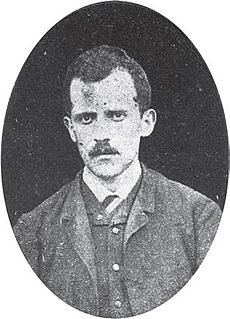 W
WPetar (Pere) Toshev (1865-1912) was a Bulgarian revolutionary and activist of the Internal Macedonian-Adrianople Revolutionary Organization. In North Macedonia he is considered an ethnic Macedonian revolutionary.
 W
WStefan Toshev was a Bulgarian general, from World War I. His mother was a teacher from the period of the National Revival. He volunteered in the Bulgarian Opalchentsi Corps during the Russo-Turkish War (1877–1878) and later served as a translator. On 10 May 1879, he graduated from the Military School in Sofia in its first year. Then he served in the Police force of Eastern Rumelia.
 W
WVladimir Minchev Vazov was a Bulgarian officer. He led the Bulgarian forces during the successful defensive operation at Dojran during the First World War.
 W
WPeyo Yavorov was a Bulgarian Symbolist poet. He was considered to be one of the finest poetic talents in the fin de siècle Kingdom of Bulgaria. Yavorov was a prominent member of the "Misal" ("Мисъл") literary and cultural group. His life and work are closely connected with the liberation movement Internal Macedonian-Adrianople Revolutionary Organization in Macedonia. He was also a supporter of the Armenian Independence Movement, and wrote a number of poems about Armenians.
 W
WPencho Ivanov Zlatev, also known as Petko Ivanov Zlatev, was a Bulgarian general and politician in the years before the Second World War.